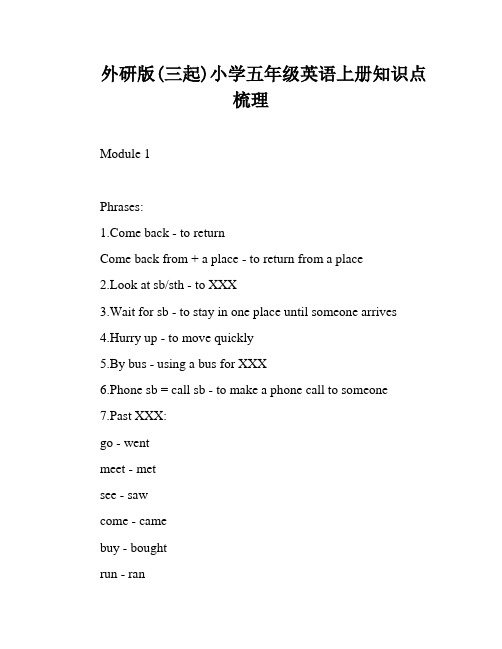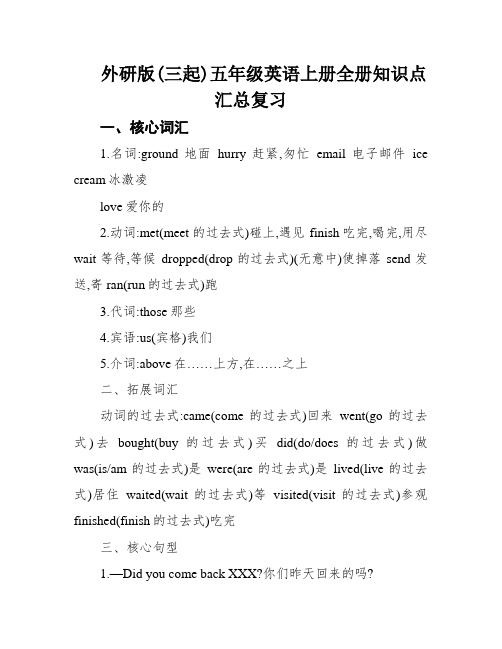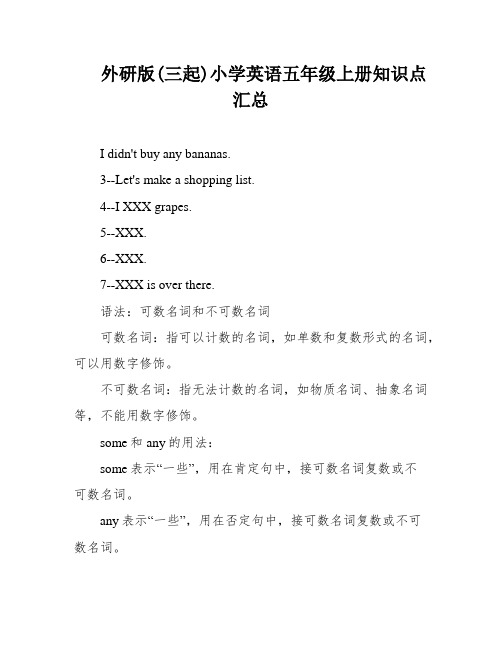外研版(三起)英语五年级上册重点知识汇总
外研版三年级起点五年级上册知识点

外研版三年级起点五年级上册知识点一、单词。
1. 描述人物的单词。
- old(年老的),young(年轻的),funny(滑稽的;可笑的),kind(体贴的;慈祥的;宽容的),strict(要求严格的;严厉的)。
- 例如:My grandma is old.(我的奶奶年老了。
)- My English teacher is strict.(我的英语老师很严格。
)2. 星期单词。
- Monday(星期一),Tuesday(星期二),Wednesday(星期三),Thursday (星期四),Friday(星期五),Saturday(星期六),Sunday(星期日)。
- 注意首字母大写。
例如:We have English on Monday.(我们星期一有英语课。
)3. 食物单词。
- sandwich(三明治),salad(蔬菜沙拉;混合沙拉),hamburger(汉堡包),ice cream(冰淇淋),tea(茶;茶水)。
- I like sandwiches.(我喜欢三明治。
)- She doesn't like ice cream.(她不喜欢冰淇淋。
)4. 学科单词。
- English(英语),maths(数学),Chinese(语文),science(科学),PE (体育),music(音乐),art(美术)。
- We have science and art on Tuesday.(我们星期二有科学和美术课。
)二、短语。
1. 描述人物的短语。
- be helpful(有用的;愿意帮忙的),be hard - working(工作努力的;辛勤的)。
- He is helpful at home.(他在家很乐于助人。
)- My sister is hard - working.(我的姐姐很勤奋。
)2. 与学校活动相关的短语。
- have classes(上课),do homework(做作业),read books(读书),play sports(做体育运动)。
外研版(三起)小学五年级英语上册知识点梳理

外研版(三起)小学五年级英语上册知识点梳理Module 1Phrases:e back - to returnCome back from + a place - to return from a place2.Look at sb/sth - to XXX3.Wait for sb - to stay in one place until someone arrives4.Hurry up - to move quickly5.By bus - using a bus for XXX6.Phone sb = call sb - to make a phone call to someone7.Past XXX:go - wentmeet - metsee - sawcome - camebuy - boughtrun - randrop - droppedXXX:1.Did you come back yesterday?2.No。
we came back last Sunday.3.Let's buy some。
(Let's + verb - Let's do something together)4.Wait for me.5.I dropped my ice cream.6.XXX cream.7.We went home by bus.Grammar: Simple Past XXXSimple past tense (verb + ed)Rules for forming past XXX:1.Add -ed to the end of the verb (e.g。
looked。
played。
visited)2.For verbs that end in e。
add -d (e.g。
lived)3.For verbs that end in y。
change the y to i and add -ed (e.g。
外研版(三起)英语五年级上册全册知识点汇总复习

外研版五年级上册Module 1 单元小结词汇动词met (meet的过去式)碰上,遇见finish吃完,喝完,用尽wait等待,等候hurry赶紧,匆忙dropped (drop的过去式)(无意中)使掉落send发送,寄ran (run的过去式)跑名词ground地面ice cream冰激凌email电子邮件love爱你的其他above在……上方,在……之上those那些us (宾格)我们短语come back回来last Sunday 上周日go home 回家hurry up 赶紧,赶快wait for等待send an email发一封电子邮件Sam and Amy's friend萨姆和埃米的朋友by bus 乘公共汽车句型1. 询问某人过去是否做过某事—Did+主语+动词(短语)原形+表示过去的时间?—Yes, 主语+did./No, 主语+didn't.·—Did you come back yesterday? 你们昨天回来的吗?—No, we didn't. 不,我们不是昨天回来的。
2. 描述某人过去的动作主语+动词(短语)过去式+其他.·We came back last Sunday. 我们上周日回来的。
3. 描述某人过去的状态主语+was/were+描述状态的词+其他.·I was very sorry. 我非常抱歉。
外研版五年级上册Module 2 单元小结词汇名词list清单cheese 奶酪bottle 瓶子;一瓶的容量kilo千克动词need需要can 可以lost (lose的过去式)丢失use使用其他er哦,嗯,呃first首先,第一;最先的,第一(次)的any一些,一点,若干half 一半短语make a shopping list 列一份购物清单half a kilo半千克a lot of许多的over there 在那边at the supermarket 在超市how much 多少句型1. 询问他人买了什么东西的句型及其答语—What did+主语+buy?—主语+bought+物品.·—What did you buy? 你们买了什么?—We bought some apples. 我们买了一些苹果。
[全]外研版(三起)小学英语五年级上册知识点归纳总结
![[全]外研版(三起)小学英语五年级上册知识点归纳总结](https://img.taocdn.com/s3/m/ce559d8e376baf1ffd4fad4a.png)
外研版(三起)小学英语五年级上册知识点归纳总结Module 1一、音标e——/iː/ Chinese, these,ea——/iː/ ear, please, teacheri——/ɪ/ it, listen, ill, sit, give, pig, bige——/e/ tell, then, pen, desk, pencil, net,a——/æ/ cat, apple, hat, bag, many, lap, value二、词汇met (meet的过去式) 碰上,遇见wait 等待,等候dropped (drop的过去式)(无意中)使掉落finish 吃完,喝完,用尽ran (run的过去式) 跑send 发送,寄ground(地面)ice cream(冰淇淋)email(电子邮件)above(在......上方,在......之上)those(那些)us(宾格)(我们)love(爱你的)三、固定搭配come back 回来hurry up 赶紧,赶快live in 住在go to the park 去公园go home 回家by bus 乘公共汽车wait for 等待last Sunday 上星期日四、句子1. How are you? 你好吗?2. I’m fine, thank you.我很好,谢谢你。
3. Come with us.跟我一起来吧。
4. Wait for me! 等等我!5. Thank you!谢谢你!五、重点句型1. 询问对方过去是否做过某事:Did you + 动词原形+ 其他?用Yes, I / we did.或者No, I / we didn’t.来回答。
eg:Did you go to school yesterday?你昨天上学了吗?Yes, I did.是的,昨天我上学了。
Did you see a film last night?你昨晚看电影了吗?No, we didn’t.不,我没看。
外研版(三起)五年级英语上册全册知识点汇总复习

Module 1一、核心词汇1. 名词: ground 地面hurry赶紧,匆忙email 电子邮件ice cream 冰激凌love爱你的2. 动词: met (meet的过去式)碰上,遇见finish 吃完,喝完,用尽wait 等待,等候dropped (drop的过去式)(无意中)使掉落send 发送,寄ran (run的过去式)跑3. 代词: those 那些4. 宾语: us (宾格)我们5. 介词: above 在……上方,在……之上二、拓展词汇动词的过去式: came (come的过去式)回来went (go的过去式)去bought (buy的过去式)买did (do/does的过去式)做was (is/am的过去式)是were (are的过去式)是lived (live的过去式)居住waited (wait的过去式)等visited (visit的过去式)参观finished (finish的过去式)吃完三、核心句型1. —Did you come back yesterday? 你们昨天回来的吗?—No, we came back last Sunday. 不是,我们上周日回来的。
解读:此句是由did引导的一般过去时的一般疑问句,询问对方过去是否做过某事。
回答时要用“Yes”或“No”。
举一反三:—Did she meet John in the park? 她在公园里遇到约翰了吗?—Yes, she met John in the park. 是的,她在公园里遇到约翰了。
—Did she come back to China? 她回到中国了吗?—No, she came back to Canada. 不,她回加拿大了。
2. We bought ice creams. 我们买了冰激凌。
解读:此句用的是一般过去时态,表示过去某一时刻或某一段时间所发生了的事情或存在的状态。
常与过去时间yesterday (昨天), this morning (今天早上), just now (刚才), a moment ago (刚才), in May (在五月), last night (昨天晚上)/year(去年)/week(上周), once upon a time (从前), the other day (前几天), in the past (在过去)等连用。
外研版(三起)五年级英语上册全册知识点汇总复习

外研版(三起)五年级英语上册全册知识点汇总复习一、核心词汇1.名词:ground地面hurry赶紧,匆忙email电子邮件ice cream冰激凌love爱你的2.动词:met(meet的过去式)碰上,遇见finish吃完,喝完,用尽wait等待,等候dropped(drop的过去式)(无意中)使掉落send发送,寄ran(run的过去式)跑3.代词:those那些4.宾语:us(宾格)我们5.介词:above在……上方,在……之上二、拓展词汇动词的过去式:came(come的过去式)回来went(go的过去式)去bought(buy的过去式)买did(do/does的过去式)做was(is/am的过去式)是were(are的过去式)是lived(live的过去式)居住waited(wait的过去式)等visited(visit的过去式)参观finished(finish的过去式)吃完三、核心句型1.—Did you come back XXX?你们昨天回来的吗?No。
we came back last Sunday.不是,我们上XXX回来的。
解读:此句是由did引导的一般过去时的一般疑问句,询问对方过去是否做过某事。
回答时要用“Yes”或“No”。
闻一知十:—Did she meet John in the park?她在公园里遇到XXX了吗?Yes。
she met John in the park.是的,她在公园里遇到XXX 了。
Did she come back to China?她回到中国了吗?No。
she came back to Canada.不,她回加拿大了。
2.XXX creams.我们买了冰激凌。
解读:此句用的是一般过去时态,表示过去某一时刻或某一段时间所发生了的事情或存在的状态。
常与过去时间yesterday (昨天)。
this morning (今天早上),just now (刚才)。
外研版(三起)小学英语五年级上册知识点汇总

外研版(三起)小学英语五年级上册知识点汇总I didn't buy any bananas.3--Let's make a shopping list.4--I XXX grapes.5--XXX.6--XXX.7--XXX is over there.语法:可数名词和不可数名词可数名词:指可以计数的名词,如单数和复数形式的名词,可以用数字修饰。
不可数名词:指无法计数的名词,如物质名词、抽象名词等,不能用数字修饰。
some和any的用法:some表示“一些”,用在肯定句中,接可数名词复数或不可数名词。
any表示“一些”,用在否定句中,接可数名词复数或不可数名词。
a lot of和lots of都表示“许多”,接可数名词复数或不可数名词。
XXX.How much cheese did you buy?XXX.XXX word to a general XXX words are: what。
who。
whose。
why。
how。
where。
and when.Phrases:1.At the XXX2.Visit lots of places3.XXX4.Have a good day5.One hour and twenty minutes6.The Great Wall7.At ten o'clock8.XXX9.Past XXX: tell-told。
go-went。
take-took。
have-hadXXX:1.Where did you go?We went to the British Museum.2.How did you go to these places?We went by bus.3.What did you do at the weekend?4.They arrived there at ten o'clock.5.Da Ming took a photo of his father.Phrases:1.Buy sth for sb = buy sb sth2.A pair of + plural noun3.Want to do4.Past XXX: buy-bought。
外研版(三起)英语五年级上册 全册知识点归纳

小学五年级英语上册知识点汇总一、动词过去式:go went buy-bought 二、短语:口1eet-metrun-ranModule 1see-sawdrop-droppedcome came do-didam/is-was are werel.went to London 去伦敦 2.a little boy一个小男孩3.see f r om above the ground从地面上空看e back =be back回来e back from+采地从某地回来6.live i n居住在7.livein+地点住在某地8.live near+地点/人住在某地/某人附近9.look at sb/sth看某人/采物10、wait for sb 等候某人1 l、hurry up 赶快12.by bus乘公交车13. w alk to school步行去学校14.send you an email给你发一封电子邮件15.a postcard from Lingling 一封来自玲玲的邮件16.went to the park去公园17 .Sam and Amy”s friend萨姆和艾米的朋友18.run to the bus跑向公i\19.go home 田家三、句子及语法:l、…Did you come back yesterday? 你们昨天回来的吗?句型结构:Did+主语+动词原形+其他答语:肯定:Yes,主语+di d2、--No,we came back last Sunday.3、Let’s buy some.我们买一些吧否定:No,主语+di d n’tLet’s+动词原形我们做……去。
巴4、Wait for me. 等等我5、I dropped my ice cr巳am.我的;水洪淋掉了。
6、We bought ice cream.我们买了一些冰洪i:林。
7、We went home by bus.我们坐公汽回家。
- 1、下载文档前请自行甄别文档内容的完整性,平台不提供额外的编辑、内容补充、找答案等附加服务。
- 2、"仅部分预览"的文档,不可在线预览部分如存在完整性等问题,可反馈申请退款(可完整预览的文档不适用该条件!)。
- 3、如文档侵犯您的权益,请联系客服反馈,我们会尽快为您处理(人工客服工作时间:9:00-18:30)。
夕卜研(三起)五年级Module 1知识汇总.本模块学习目的:了解并熟练掌握一般过去时,•掌握动词原形变过去式的变化规则。
一、词汇动:名词:ground (地面)ice cream (冰淇淋)email (电子邮件)其他:above (在……上方,在……之上)those (那些)us (宾格)(我们)love (爱你的)二、语音知识三、习惯搭配四、常用表达五、重点句型1.询问对方过去是否做过某事:-Did you +动词原形+其他?―Yes, I we did. No. I we didn't.eg: 1, — Did you go to school yesterday?-Yes. I did.2.—Did you see a film last night?―No. we didn't.2. 描述某人过去做过某事:主语+动词过去式+其他.eg: 1.1 met my English teacher yesterday.2. Bob lost his pet dog last Friday.一、词汇动词:need (需要)lost (丢失)(lose的过去式)use (使用)其他:list (清单)er (哦,嗯,呃)can (可以)cheese (奶酪) first (首先,第一;最先的,第一(次)的)half (一半) any (一些,一点,若干)bottle (瓶子;一瓶的容量)kilo (干克)二、语音知识四、常用表达I don't know, 我不知道。
五、重点句型1.如何询问物品的数量:①How much + 不可数名词+ do you have?②How many +可数名词复数+ do you have?2.一般过去时的特殊疑问句句型:一特殊疑问词+did+主语+动词原形+其他,一主语+动词的过去式+其他.eg: 1, —What did you do last Friday?—I did my homework.2.—How much milk did you buy?—I bought a bottle of milk.—、词汇1.weekend 周末2. place 地方3.British英国的,英国人的;英国人4.museum博物馆5. how如果,怎样6. best最7.took (take的过去式)搭乘,乘坐(交通工具);二、语音知识四、重点句型1.-Where did you go? -I / We went (to ) + 地点.eg: -Where did you go? -We went to the British Museum.2.某人+ took a photo of + 他人.eg: Daniing took a photo of his father.外研(三起)五年级Module 4知识汇总-、词汇1.pair ―套,一双,—副2. shorts (常复)短裤3.argue争论,争吵4. matter问题,麻烦5.took (take的过去式)拿(走)取(走)6.wear 穿7. hey 嘿,喂8.sports体育运动的,体育运动用的二、语音知识三、习惯搭配1.Don't argue!不要争吵!2. What's the matter? 怎么啦?3.I'm so soixy. 我很抱歉。
4. That's OK. 没关系。
5. Look!看!6. Great!太好了 !7.Thank you.谢谢你。
五、重点句型1.主语+ bought +某物+ for +某人eg: Mum bought a new T-shirt for me.1.There are +基数词+可数名词复数(+其他).eg: There are only nineteen crayons.译文:只有十九支蜡笔。
There are only live apples, but there are twenty children in the class. 译文:只有5个苹果,但是班级里有20个孩子。
1. p. pp t / p / 例子:pen. pencil, apple, happy2. b — / b / 例子:banana, football, book, about3. t — / t /4列子-team. great, take, truit4. d— / d / 例子:dog, hand, day. old 三、习惯搭配 9. a fantastic goalkeeper —名极好的守门员 四、 惯用表达1. Not very well.不太好。
2. Hooray!万岁!3. Thank you.谢谢你(们)。
五、 重点句型1- You can +动词(短语)原形+ well.eg: You can play football well. Lingling. 译文:你能踢得好足球,玲玲。
You can play the piano well. 译文:你可以弹好钢琴。
一、单词1 •useful有用的 2. show (电视或广播)节目1.k. c — / k / 例子:kite. bike, music, cat2.g-/g/ 例子: green, dog. good, get3. f. ff — / f/ 例子:tish.fly, coftee. office4.v 一/ v / 例|子:visit, love, very、ha\ e三、习惯搭配1.主语+ can't +动词(短语)原形(+其他). eg: He can't see, 译文:他看不见。
肯定形式是can与动词原形搭配,表示”能做某事"。
eg: I can't sing, but I can play the piano.译文:我不会唱歌,但是我会弹钢琴。
1.s, c — / s / 彳列子:sun. see. rice, place2.z. s 一/ z / 例子:zoo. zebra, nose, rose3.th 一/d/ 例子:this, mother, that, vxith4.sh 一/J'/ 例子:shoe, tish. ship, wash5.r — / r/ 例子:red. robot, read, ride6.h 一/ h / 例子:house, head, horse, holiday11.in the playground 在操场上四、惯用表达1.Let's go to bed.让我们上床睡觉吧。
2.What's the time now? 现在几点了。
3.That's fantastic!太好了 !五、重点句型1. What time do does +主语+动词原形(+其他)? eg: What time does your school start?译文:你们几点开始上课?2 .主语+动词过去式(+其他)■eg: Yesterday I went to Sam and Amy's school.译文:昨天我去了萨姆和埃米的学校。
一、词汇feel感觉,觉得bored厌烦的,厌倦的sad伤心的,难过的woof (狗发出的)吠声miss想念angry生气的,愤怒的ill有病的,不健康的told (tell的过去式)告诉better痊愈的,恢复健康的 farm农场tired累的,疲劳的won (w in 的过去式羸荻胜ruler 直尺smell闻出,嗅出二、句子1. Are you ieeling bored?你感觉无聊吗?12. Are you feeling sad?你感觉难过吗?3. Does she feel angry?她感觉生气吗?4.How does he teel?他感觉怎么样?5.What's the matter?怎么啦?6.1called my mum yesterday.我昨天给妈妈打电话了。
7.M\- grandma is ill in hospital.我的奶奶生病住院了。
8.She told me that她告诉了我那件事。
三、句型结构1. —Are you feeling ...?—Yes. I am. / No. I'm not.'Are you feelings表示感受的形容词(happy, angry, tired... )? ”用来询问对方是否有某种感受。
eg: —Are you feeling sad?你感觉伤心吗?—Yes, I am.是的。
2.— Is he she feeling ...?—Yes, he she is. No. he she isn't. He She is...eg: —Is she feeling tired?她感觉累吗?—No, she isn't. She is missing her grandpa.不,她在想念她的爷爷。
3.What's the matter?其后常接with sb..用于询问某人怎么了。
eg: —What's the matter with him?他怎么了 ?—He is山in hospital.他生病住院了。
4.How does he feel?用于询问他人感觉怎么样?eg: —How does she feel?她感觉怎么样?—She feels hungiy.她感觉饿了。
一、词汇kitchen厨房toilet厕所,卫生间room房间living room起居室,客厅hide-and-seek捉迷藏now好,0我last最后hide 躲,躲藏 sola沙发 shout呼喊,大叫 grass草,草地 baby婴儿 dangerous危险的I二、句子1. He is in the bedroom,他在卧室里。
2.He was in the kitchen.他在厨房里。
3.Where did you find the schoolbag?你在哪儿找到书包的?4.1found Lingling in the toilet.我在卫生间找到玲玲的。
5.1found Tom last.我最后找到汤姆的。
6.He won the game .他赢了比赛。
7.I'm the winner.我是获胜者。
8.Don't shout in the zoo!请不要在动物园大叫!9.Don't walk on the grass! 践踏草坪!10.Don't climb the tree!不要爬树!11.Let's go and see the pandas.我们一起去看大熊猫吧。
